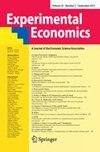Endowments, expectations, and the value of food safety certification: experimental evidence from fish markets in Nigeria
IF 1.7
3区 经济学
Q2 ECONOMICS
引用次数: 0
Abstract
Abstract We study the impact of endowments and expectations on reference point formation and measure the value of food safety certification in the context of fish trading on real markets in Nigeria. In our field experiment, consumers can trade a known food item for a novel food item that is superior in terms of food safety––or vice versa. Endowments matter for reference point formation, but we also document a reverse endowment effect for a subsample of respondents. The effect of expectations about future ownership is weak and mixed. While expectations seem to affect bidding behavior for subjects “trading up” to obtain the certified food product (a marginally significant effect), it does not affect bids for subjects “trading down” to give up this novel food item. Finally, willingness to pay for safety certified food is large for our respondents—our estimate of the premium is bounded between 37 and 53% of the price of conventional, uncertified food.

禀赋、期望和食品安全认证的价值:来自尼日利亚鱼市场的实验证据
我们研究了禀赋和期望对参考点形成的影响,并在尼日利亚真实市场上的鱼类交易背景下衡量食品安全认证的价值。在我们的实地实验中,消费者可以用一种已知的食品来换取一种在食品安全方面更优越的新型食品,反之亦然。禀赋对参考点的形成很重要,但我们也记录了受访者子样本的反向禀赋效应。对未来所有权的预期的影响是微弱和混杂的。虽然预期似乎会影响受试者“向上交易”以获得认证食品的投标行为(一个略微显着的影响),但它不会影响受试者“向下交易”以放弃这种新型食品的投标。最后,对我们的受访者来说,购买安全认证食品的意愿很大——我们估计的溢价在传统的、未经认证的食品价格的37%到53%之间。
本文章由计算机程序翻译,如有差异,请以英文原文为准。
求助全文
约1分钟内获得全文
求助全文
来源期刊

Experimental Economics
ECONOMICS-
CiteScore
4.10
自引率
8.70%
发文量
40
期刊介绍:
Experimental methods are uniquely suited to the study of many phenomena that have been difficult to observe directly in naturally occurring economic contexts. For example, the ability to induce preferences and control information structures makes it possible to isolate the effects of alternate economic structures, policies, and market institutions.Experimental Economics is an international journal that serves the growing group of economists around the world who use experimental methods. The journal invites high-quality papers in any area of experimental research in economics and related fields (i.e. accounting, finance, political science, and the psychology of decision making). State-of-the-art theoretical work and econometric work that is motivated by experimental data is also encouraged. The journal will also consider articles with a primary focus on methodology or replication of controversial findings. We welcome experiments conducted in either the laboratory or in the field. The relevant data can be decisions or non-choice data such as physiological measurements. However, we only consider studies that do not employ deception of participants and in which participants are incentivized. Experimental Economics is structured to promote experimental economics by bringing together innovative research that meets professional standards of experimental method, but without editorial bias towards specific orientations. All papers will be reviewed through the standard, anonymous-referee procedure and all accepted manuscripts will be subject to the approval of two editors. Authors must submit the instructions that participants in their study received at the time of submission of their manuscript. Authors are expected to submit separate data appendices which will be attached to the journal''s web page upon publication. Officially cited as: Exp Econ
 求助内容:
求助内容: 应助结果提醒方式:
应助结果提醒方式:


